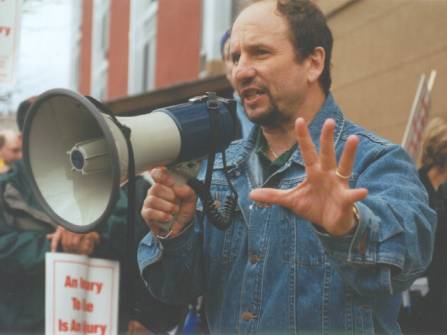

|
Oct. 25, 2002 -- Senator Paul Wellstone was killed on Oct. 25 when his
campaign plane crashed in northern Minnesota. The senator's wife, Sheila
Ison Wellstone, and daughter, Marcia, also died in the crash, as did
three of Wellstone's staff members, Will McLaughlin, Tom Lapic and Mary
McEvoy, and two unidentified pilots.
The Wellstones are survived by two sons, David and Mark, and six grandchildren: Acacia, Matt, Cari, Keith, Joshua and Sydney. The senator was en route to Eveleth, Minnesota for the funeral of a state lawmaker's father, according to the Associated Press. He was also scheduled to debate with his opponent, Norm Coleman. The race was widely regarded as one of the most competitive Senate contests during an election year when the Senate balance is at stake. President Bush, hosting Chinese President Jiang Zemin at his Crawford ranch, greeted news of Wellstone's untimely death with the words, "Our prayers and heartfelt sympathy goes to their sons, their loved ones, their friends and the people of Minnesota. Paul Wellstone was a man of deep convictions. He was a plainspoken fellow who did his best for his state and for his country. May the Good Lord bless those who grieve.'' Senate Majority Leader Tom Daschle (D-S.D.) remembered Wellstone as the "soul of the Senate. He was one of the most noble and courageous men I have ever known." Senator Patrick Leahy (D-Vt.) told CNN, "It's a terrible, terrible time... Whether you agreed with him or not politically, you had to like him. Everybody liked him, he was extremely honest, he did what he would say he would do. He wasn't at all interested in the trappings of power. He was there to help people that didn't have a voice that didn't have any power." The flamboyantly liberal Wellstone, 58, was born to Jewish-Russian immigrants in Washington, D.C. in 1944 and raised in Arlington, Virginia. He attended the University of North Carolina, where he earned his Ph.D. before moving to Minnesota in 1969 to teach political science at Carleton College.
He was arrested for picketing a bank that had foreclosed on farmers, and in the late 1970s he mobilized rural Minnesotans to fight against the installment of a high-voltage power line. He also led protesters against Hormel meatpacker strikers in Austin. In 1998, Wellstone co-chaired Jesse Jackson's presidential campaign in Minnesota. Wellstone's election to the Senate in 1990 was considered one of the major electoral upsets of the decade. Polls from shortly before Election Day showed him to be running far behind his opponent, incumbent Republican Sen. Rudy Boschwitz. Wellstone responded by taking a low-budget, grassroots approach. He traveled through Minnesota in a green bus that became a campaign trademark, worked with a dedicated corps of volunteers and launched a low-budget but high-success ad campaign. In the groundbreaking campaign advertisements, candidate Wellstone starred in his own version of Michael Moore's documentary, "Roger and Me." Wellstone's approach worked, and he became the only candidate in 1990 to unseat an incumbent. He carried the Twin Cities 54 percent to Boschwitz's 45 percent, and won the state with a narrow 50 to 48 percent. Wellstone's voting record is among the most liberal in Congress. "Mother Jones" hailed his inauguration as the arrival of "the first 1960s radical elected to the U.S. Senate." In 1991 he led opposition to an energy bill that would have permitted drilling for oil in the Arctic National Wildlife Refuge. A vociferous opponent of the Gulf War, Wellstone also took issue with President Clinton's decision to send troops to Haiti without congressional consent. In 1999, Wellstone was one of three senators to oppose national missile defense legislation.
Wellstone was known for his passionate support of health care rights, fighting with Senator Pete Domenici to extend their 1996 mental health law and requiring parity in treatment of mental illnesses. He also introduced a bill expanding medical coverage available to recovering addicts. Senator Wellstone faced an uphill challenge in securing his third term, since his decision to run went against a long-held promise to serve only two terms in Washington. Having made his two-term promise in 1990 and again in 1996, Wellstone cited the Senate's 50-50 split in his decision to run, saying "so much has changed and so much is at stake." Senator Wellstone was running for re-election despite being recently diagnosed with a mild form of multiple sclerosis. The flags at the White House and the U.S. Capitol were lowered to half-staff just minutes after federal officials confirmed the senator's death. --By Jessica Moore, Online NewsHour |
